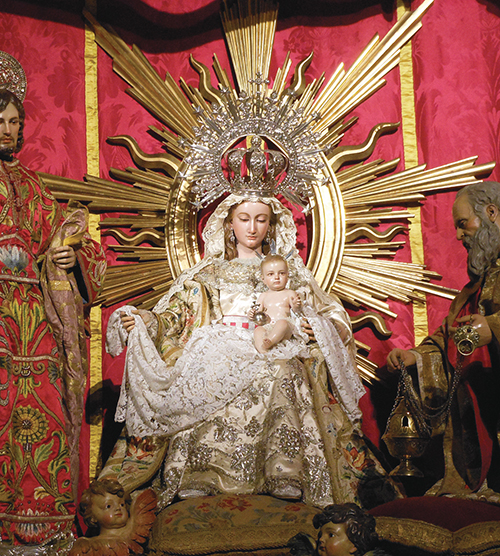
The joy of Christmas
Monday, December 22, 2014
*Rogelio Zelada

The Virgin of the Nativity, an 18th century image on display in the Church of San Ginés in Madrid, Spain.
After the King of Assyria shattered the walls and the hopes of Israel, the prophet Isaiah does not cry or lament, but speaks with God and proclaims a new time of blessings to a people walking in the darkest night of their exile. In the name of the Lord, he promises an overflowing source of joy: the sign of a child that will be born, the divine hero, the prince of peace; the arrival of a luminous time that will make them quiver with joy before the Holy One of Israel that is to come.
In a similar way, Zephaniah acknowledges with amazed enthusiasm that his God is so compassionate and merciful, that He not only jumps with joy at being among His children, but shouts with joy when He embraces them, as any Israelite would do when celebrating the holidays with friends and family. According to the tradition of Israel, the joy of God is the great sign of his presence in the history of salvation and in each one of the characters and events that are building it.
When the skeptical Zechariah was given the news about Elizabeth’s pregnancy, the jubilant messenger of God announces that Zachary will have a future filled with happiness; the birth of a son that will bring joy to many in Israel; a liberating joy that will transform Elizabeth’s life because the Lord, in his goodness, has redeemed her from the humiliation of her dry womb, incapable of giving life.
Rejoice! It reverberates in the cave in Nazareth, where a young Mary lives, and it is like the first great note of the Gospel symphony that is beginning. That same shout of joy will make John leap in Elizabeth’s womb, and will explode with enthusiasm in the solemn canticle which Mary sings with delicate inspiration for the wonders that the Almighty has done in her and through her.
It’s such a profound joy that it loosens the tongue of old Zechariah, and makes him compose a song with the taste of a psalm, which counts the endless promises and goodness of the God of Israel; it is the same joy that inundates the night in the fields of Bethlehem with the extraordinary concert of a finely-tuned choir of angels that astonishes the poor shepherds of the region with the announcement of the irruption of the Savior, the Lord, who has been born as poor as them, and who has spent his first night among his people, lying over the straw of a rustic trough.
After traveling a very long way, a group of wise men of well-respected fame cross the walls of Zion with a caravan crammed with servants and packed with supplies needed for the long journey to reach the King. They know that he was born in Judea because that is how the shining star, with an unusual and extraordinary splendor, announced it. Given that Herod has no knowledge of it, they will ask doctors and scribes who, with all the wisdom of their knowledge of the Law and the prophets, determine that it will be in the tiny village of Bethlehem, the “House of Bread”, the homeland of Jesse, father of the great King David.
Their joy increases when they see the star that has quietly placed itself over the house of the newborn to avoid any doubt. Matthew describes with detail an entire scene of royalty: there they will find and will be received by the King, with the Queen, his mother, as called for by the solemn protocol of welcome. After the obligatory gifts, they will not return to their land along the same route, because everyone who has seen the light of Christ and has experienced the joy of having it cannot walk the same old path.
Joy is a clear
signal of the passage of Jesus and the apostles through the land of salvation;
the announcement of the Gospel constantly gives joy; the disciples are filled
with joy when they see their risen Lord; the apostles live joy when they must suffer
for fidelity to their Master; and there is and always will be joy in heaven for
a single sinner who repents.


Comments from readers